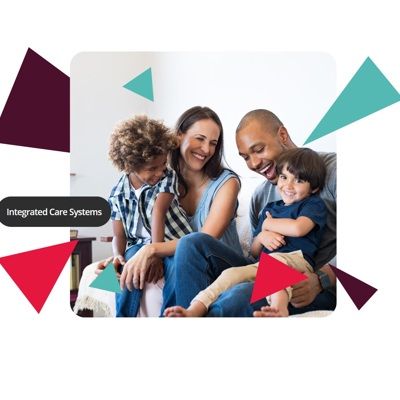 HSC Support
HSC Support
Integrated Care – Solutions Built to Improve Health and Social Care Outcomes
Integrated care is paramount if we're serious about supporting the ageing population and alleviating the pressures on the health and social care sectors. Not only is this approach to care delivery one that can resolve some of the major challenges in healthcare, it’s also the most effective form of prevention and intervention that can save lives.
Here’s how integration can help you and your organisation save valuable time, money, and deliver better outcomes for everyone involved.

How Does Integration Affect the Continuum of Care?
Despite living in an era dominated by technology, countless individuals do not receive the level of appropriate care they need.
Whether this is due to a breakdown in communication between healthcare providers, outdated systems and processes where information goes missing or is logged incorrectly, or a lack finances and insufficient resources – all these things create holes in operations, which leads to disjointed care that drastically affects the quality being provided.

Unlock the Potential of Integrated Care: Challenges, Opportunities, and Tech Solutions
The Challenges for ICBs
Integrated Care Boards (ICBs) face mounting challenges as they strive to meet the growing demands of the health and social care system. With over 7.6 million people on NHS waiting lists and 1.2 million awaiting access to community-based mental health services, rising demand continues to outpace capacity, leading to significant delays in care delivery.
In addition, staff shortages, underfunding, and the use of multiple disjointed systems hinders the ability to move forward. These challenges highlight the urgent need for streamlined, integrated solutions to improve health outcomes and operational efficiency.
+
redundancies were reported within ICBs between 2023-2024.
+
million hours of clinical time lost annually due to poor IT infrastructure
%
of staff feel there are enough employees in their organisation to manage workloads.
%
In patient satisfaction, marking the lowest level in 40 years
Overcoming the Barriers to Integration
With ICBs and the wider health and social care sector facing these major challenges, the path towards integration is long and sinuous. Redesigning care delivery to better integrate technology, reduce inefficiencies, and improve both outcomes and accessibility is the only way forward and must encompass the following solutions:
Utilising Community Services
With hundreds of hospitals grappling with a backlog of patients waiting to be admitted, treated, or discharged, the strain on acute services is unprecedented.
Preventative initiatives like hospital at home, virtual wards and tech-enabled care models undoubtedly help address these challenges, but as Lord Darzi highlights in his 2024 report, leaning on the community and voluntary sector is crucial for tackling the social determinants of health.
This support is vital for individuals facing long-term conditions and mental health issues, as well as facilitating early intervention strategies at the community level. Whether it’s through social prescribing initiatives, fall prevention services, or rapid crisis response services, such efforts are essential not only for preventing avoidable hospital admissions but also for helping individuals maintain their independence, thereby reducing ambulance call-outs and the footfall in A&E departments.

Download our whitepaper to explore solutions that transform integrated care
We Join the Dots to Help You Deliver Exceptional Care
At Access, we firmly believe a holistic, collaborative approach is the best way to mitigate the challenges preventing integration and enable ICBs to better meet peoples’ needs.
Our full suite of connected solutions empower health and social care providers to deliver exceptionally-high standards of care, with the person always at the centre.
Access Adam Commissioning
Discover how our brokerage commissioning software can help your ICS streamline processes and remain compliant with NHS and CQC regulations.
Patient Flow Management
Get real-time views of bed occupancy and speed up discharge. APFM ensures patients are receiving the right care in the right place at the right time.
Access Elemental Social Prescribing
Integrate your GP software with our social prescribing solutions to bridge the gap between health, housing, and local services and enhance community mental well-being.
Patient Journey Manager
An end-to-end solution that empowers teams to support a patient all the way through their journey, from referral, through to admission, to discharge.
Rio Electronic Patient Records
A fully centralised EPR that integrates with all your in-house systems to give you all the info you could ever need on a patient in one accessible place.
Digital Telecare
Expertly designed digital monitoring tools and state-of-the-art alarm functions to prevent readmission and support a person’s recovery at home.
Virtual Wards
A cost effective alternative to hospital wards that allow healthcare providers to provide high-quality patient care remotely.
Social Care Case Management
Integrate your health and social care data across all platforms to save time, money, and streamline workflows.
Care Compliance
Pass your CQC inspection with flying colours and carry out all your audit and inspection needs in one handy little app.
Scheduling and Rostering
Manage your staff schedules with our single-sign on rostering solution. Allocate shifts, manage payroll, HR, and more.
Medication Management
Order, manage and administer your clients’ medication safely and effectively with our robust electronic MAR system.
Integration Across the Board with Access Intelligent Care
Transform your health and social care operations with Intelligent Care, a platform that unites people, processes, and systems to streamline workflows and enhance collaboration across the whole ICB.
Why Access: Our proven track record
We are unique in delivering digital critical systems across the Care Continuum, with our solutions already protecting individuals at home and embedded in many Virtual Wards.
Integrated Care FAQs
What is integrated care?
Integrated care refers to a coordinated, “closed-loop” approach to healthcare delivery, where services are interconnected across different providers, places, and systems. This strategy aims to provide patients with comprehensive, holistic care that’s delivered more efficiently than the current methods.
How does integrated care improve patient outcomes and experiences?
Collaboration naturally enhances patient outcomes by ensuring that all stages of their health journey are seamlessly coordinated from end to end. From initial treatment and referrals to transitions of care and eventual discharge, integration ensures accurate documentation and sharing of vital information, reducing medical errors, delays, missed treatment opportunities, and unnecessary admissions.
What are the challenges of implementing integrated care initiatives?
While some trusts and organisations have embraced an integrated approach to healthcare delivery, others lag behind, which creates operational hiccups and gaps in miscommunication. This may stem from outdated systems or processes, a lack of funding and resources, workforce shortages, or similar challenges, which prevent the implementation of integration on a national scale.
How can an integrated care model promote interoperability and ensure accurate data sharing between healthcare providers?
Seamless integrated care is only possible when systems and people communicate with each other. In terms of interoperability, this translates into the right people having access to the same information and being able to perform their jobs without needing to learn any new systems or processes; data is accurately captured, shared to all the relevant systems, and readily available whenever someone needs it.
Learn more about how Access can support you


 AU & NZ
AU & NZ
 SG
SG
 MY
MY
 US
US
 IE
IE







